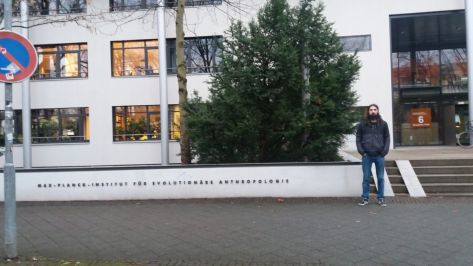NewsNext Previous
The research stay of José Ramón Rabuñal at the Max Planck Institute
The objective was to learn new techniques to better understand how activities were organised in prehistoric settlements
The IPHES (Institut Català de Paleoecologia Humana i Evolució Social) predoctoral researcher, José Ramón Rabuñal, completed a three-month research stay at the Department of Human Evolution of the Max Planck Institute for Evolutionary Anthropology (Leipzig, Germany), under the supervision of Dr. Shannon P. McPherron.
The purpose of the stay was to expand his training in intra-site spatial analysis techniques. This type of methodology is directed towards understanding how space is organised in settlements by studying the spatial distribution of occupation evidence.

His research aims to reconstruct, within the framework of his doctoral thesis, the formation processes and the spatial organisation of Mesolithic occupations in the open-air site of the Arenal de la Virgen (Villena, Alicante), between 9,200 and 8,300 years ago. This site was recently excavated in the framework of the ERC PALEODEM research project (Ref.683018), which focuses on the analysis of demographic dynamics and cultural transmission processes during the Pleistocene-Holocene transition in the Iberian Peninsula.
After three months learning and applying new spatial statistics techniques, he will join the rest of the PALEODEM team to prepare scientific publications and disseminate the European project’s research results.
José Ramón Rabuñal’s stay was financially supported by the URV (the University Rovira i Virgili in Tarragona) and the European Commission, through an Erasmus-Placement mobility grant within the Erasmus + program, as well as by the ERC PALEODEM project.


